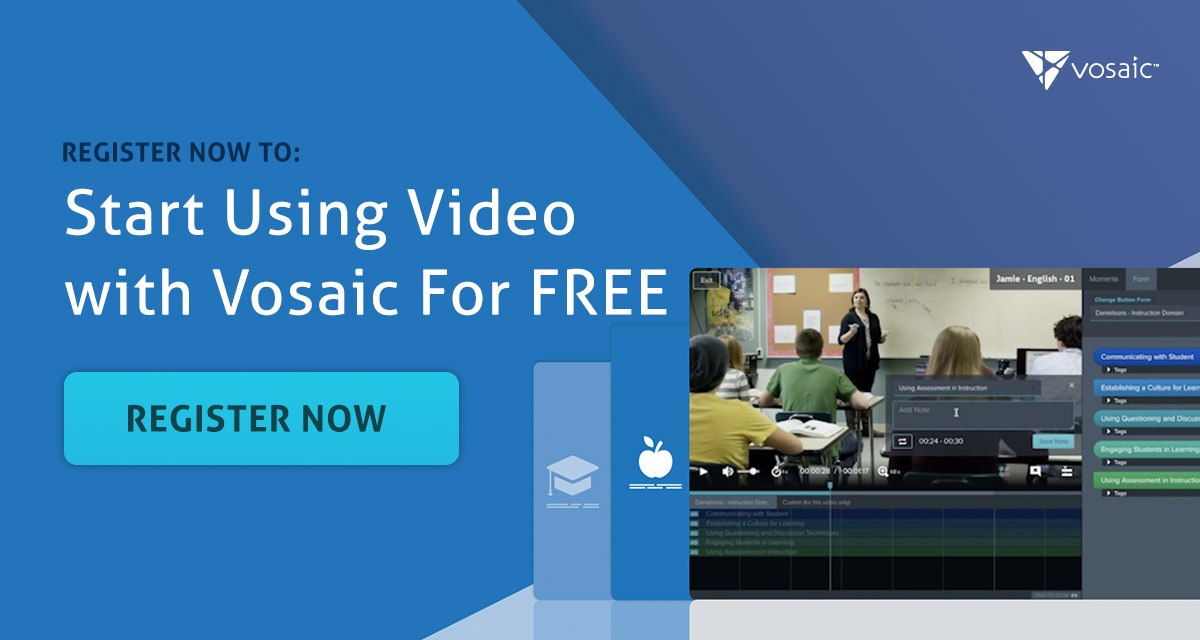In today's ever-changing educational landscape, K-12 districts face significant challenges in attracting and retaining teachers. Research shows nearly one-third of educators are considering leaving their roles before the start of the year as school leaders also consider exiting at similar rates, almost 31 percent. In light of these statistics, districts are considering innovative teacher retention strategies to combat turnover and strengthen relationships between leaders, teachers, and students.
One approach gaining momentum is the use of video-based coaching as a tool to promote teacher retention and increase satisfaction. Video coaching is a professional development technique that utilizes recorded classroom videos for observation and feedback to engage in evidence-based discussions around teacher practice and professional learning. Video makes teaching visible allowing teachers to see themselves in action and uncover insights that may have been missed in real time.
Using video as a tool for coaching helps remove barriers and bias and provides teachers with highly targeted, individualized feedback to strengthen instructional skills and address the unique needs of each classroom.
Research conducted by the Insititute of Education Sciences examined a strategy for providing individualized coaching to teachers based on videos of their instruction. They found that teachers who engaged in five coaching cycles using videos of their practice improved students’ achievement, including novice teachers and those with weaker classroom practices.
While video in education isn’t new, video-based coaching gives teachers the immediate support they need to gain a voice in their professional development and strategically grow. Instructional coaches and school leaders can engage in thoughtful discussions around good teaching practice and help provide teachers with an enhanced sense of value and belonging in their learning communities.
Why are teachers considering leaving?
McKinsey researched to better understand why teachers are leaving their positions and what can make them want to stay. They surveyed more than 1,800 US educators, school leaders, and school mental health professionals at the end of the 2021-22 school year to uncover insights into what teachers may feel in the post-pandemic era.
They identified three main driving factors for educators exiting the profession:
Compensation: A staggering 75% of educators say they put more into their job than they receive in return. Nearly 69% of those surveyed felt their total compensation, including base salary and bonuses, did not reflect their qualifications and efforts. Additionally, 65% reported an inability to live comfortably off their earnings from their teaching positions.
Unreasonable expectations: Teachers reported feeling overworked and undervalued in their roles. Nearly 75% of respondents reported having too much work to do and not enough teachers to carry the workload.
Inability to protect their well-being: Respondents reported expectations to give too much time and energy to their jobs at the expense of things outside of work that is meaningful to them. It’s worth noting that stressors may be higher in resource-challenged districts, where responsibilities taken on by new staff are currently being divided among existing staff further complicating their workload.
As districts often lack the ability to adjust salaries, allocations like ESSER funding enable schools to invest in the necessary tools for teachers and administrators to address the complexities of today’s classrooms.
Stay on Top of Important Discoveries
We read case studies and academic journals so you don’t have to. Sign up and we’ll send you the key takeaways.
How can video-based coaching help?
Video captures everything objectively, allowing feedback to be evidence-based and reflective of actual moments within instruction. Coaches can pause, replay, and pinpoint specific areas of practice to discuss with teachers and gain a better understanding of their actions and strategies to know how to help them best.
The Center for Education Policy Research at Harvard found in their “Best Foot Forward” study that teachers who participated in video observations, as opposed to in-classroom observations found the following benefits:
Increased teachers' perception of fairness
Reduced defensiveness in post-observation discussions
Greater self-criticism by teachers
Shifting observation duties to non-instructional school hours for supervisors and administrators
Unlike traditional in-person observations, which can be very resource-heavy, video gives teachers the flexibility to record multiple takes and submit videos of their choosing at a time that works best. Given the ability to ask for feedback on certain aspects of instruction, teachers can gain a greater sense of autonomy and control over their progress leading to increased satisfaction and retention.
Teachers can elicit feedback on classroom management, relationship development, or students' understanding of the content being taught and receive guidance on best practices from experienced educators and highly trained coaches. Observers can leave prompts for teachers to reflect and respond engaging in ongoing discussions for future goal-setting and improvements.
Video is flexible in nature, enabling coaching cycles to meet in-person or remotely, accommodating teachers' schedules, and promoting a healthier work-life balance. By building a collaborative, and reflective learning community teachers can feel encouraged to stay where they are and foster new relationships to learn from one another.
If you don't have a Vosaic account, you can start with a free trial today.
McKinsey cited meaningful work as the number one factor for teacher retention, with nearly 93% of educators agreeing their work helps others. Community and colleagues were also cited as key factors in teacher retention, with nearly 87% reporting their coworkers show genuine concern for one another, and 83% citing their coworkers help one another achieve their work goals.
Video-based coaching with platforms like Vosaic enables educators to have secure, private conversations with coaches and colleagues to feel supported and connected to their work and learning communities. Video coaching can be an excellent, cost-effective way to provide teachers with immediate, personalized support to improve student achievement and target professional growth at all stages of a teacher's career.
Final Thoughts
It is more important than ever for teachers to receive individualized and highly targeted support to remain confident and satisfied in their positions for years to come. By enabling trained coaches to see what’s happening in the classrooms, video-based coaching can bring teachers together and provide them with a sense of belonging needed for long-term success within their schools. Additional research on the effectiveness of video-based coaching for retention is needed and is showing great promise for providing teachers with the autonomy and support necessary to feel valued and have a sense of belonging in their positions.
As your school determines its best steps forward, it is important to approach teacher retention strategies with a collaborative approach focusing on developing a positive, supportive learning environment that fosters professional growth, collaboration, and work-life balance helping teachers feel comfortable and remain in the profession.

Vosaic is a video-based platform for instructional coaches to provide accessible, evidence-based feedback to teachers on their practice. Videos can be uploaded, recorded, and stored securely for repeatable coaching opportunities and growth among the entire district.



